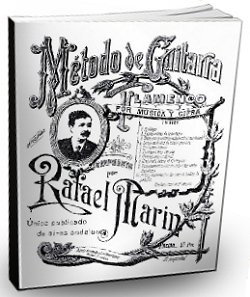Flamenco guitar strings
What type of string is best for your guitar depends on several things, mainly relating to the action. The
action of a guitar is the distance between the strings and the frets and determines how much pressure you need
to apply to the string to get a clean sound. A low action makes a guitar easier to play but the downside is
string buzz. Buzzing occurs if the fret wires are uneven along the fretboard of if you tend to attack the
strings with a heavy right hand when playing. Another cause of unwanted buzzing noise is a warped neck.
Which brand?
A brand of strings that suit one guitar may not suit another. The best way to determine which is best for your
guitar is through experiment. Some popular brands of nylon strings are Savarez, Augustine and D'Addario. La
Bella and Hannanbach are two brands that are specifically promoted as suitable for flamenco.
What tension?
There are 3 common tensions to choose from with most brands. Low, Normal and High.
I personally find high tension a little too hard on the fingers because more pressure is required to hold down
the strings. Low tension feels a little too floppy for me and is prone to produce buzzing. If your guitar has a
reasonable low action, you might feel comfortable with medium or even high tension. If your action is a little
on the high side, you could benefit from using low tension strings. If you're not sure about tension is best
choose normal or medium tension to start with.
Extending string life
1) Bass strings will naturally wear as a result of contact with the fret wires. Before this wear becomes
excessive, loosen the string and pull it through the hole at the saddle about a centimeter or so. The idea is
to shift the worn section so it appears over the spaces between the frets when you tighten it back up
again.
2) Reverse the bass strings when they become worn so that you end up with a fresh section over the sound
hole.
3) Use a cloth impregnated with lemon oil before and after playing.
Brighten up dull strings
1) Perspiration on the hands may dull the resonance in the bass strings. If this occurs, loosen the strings and
tighten them up again.
2) Another, more radical method is to wipe the tightened string with a cloth soaked in methylated spirits. Lift
the string a couple of centimeters at the 12th fret and let it slap back to the finger board. This should
loosen and shake some of the gunk out of the strings.
Changing strings
It is always a good idea to change the strings one at a time in order to maintain a constant tension on the
neck and bridge. Tune each new string up to concert pitch before removing the next old one
How often to change the strings
When I was playing flamenco every day in dance classes and performances, as well as doing lots of practice at
home, I was going through strings at a rate of one set a week. I really liked the Saverez 520R pink card
strings. Apart from the long life and excellent intonation of the trebles, the basses had a bright, biting
sound that appealed to me.
However, Saverez are not cheap so I looked or alternatives. I found the Martin budget strings were half the
price and has pretty decent basses. Even the trebles sounded good. So I reached a compromise. I found a store
that sold Saverez strings as singles as well as complete sets. When the basses wore or one of them broke,
(usually the D string) I would keep the Saverez trebles and replace all the basses with Martin budget classical
strings.
How well the guitar is made makes a difference.
I found that cheap factory made guitars sound great terrific with brand new strings but sound flat and lifeless
after a few days. This is not the fault of the strings, but the guitar. On the other hand, I once played a 50
year old Reyes flamenco guitar that was sitting around unplayed for years. The strings were
worn and basses were black and dirty with gunk. But the sound was magnificent. I was really impressed with how
bright the trebles were and the way the bass notes vibrated through my body as I held the guitar against my
chest in the typical flamenco sitting style.
As you can see there is no simple answer to which strings are best for YOUR guitar.
Experiment and find your own best brand and type of strings.
The basic needs are.
How they feel
How they sound
How quickly they wear
How expensive they are
Finally, don’t get sucked into the advertising hype that one string is supposed to be better than all the rest.
I remember reading an interview once in which someone asked Paco de Lucia what brand of strings he uses. He
said that when he needs strings while on tour he just uses whatever brand of classical strings he can lay his
hands on. It’s not practical to be fanatical about brands. Playing guitar is about making music, not about
being precious about the hardware.

Guitar strings
|
|

Download my CD
Flamenco Dance Forms

Rafael Marin
Flamenco guitar method 1902
Flamenco guitar method 1902
My classical guitar teacher.


